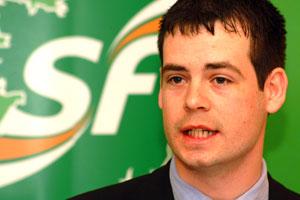Donegal by-election signals significant change

If today's Paddy Power Red C opinion poll is anything to go by, the result of next weeks Donegal South West by-election look could herald a greater degree of electoral and political change than previously anticipated. Eoin Ó Broin
Five hundred voters from across the constituency were asked to state their preferences for the by-election, for a future general election and for Taoiseach. The results of the poll are startling in a number of respects.
The first is the massive swing for Sinn Féin's Pearse Doherty to 40% in the by-election and 31% in the general election. Sinn Féin secured 11% in the 2002 general election and 21% in 2007. So a 10 to 20 point jump is remarkable, particularly when set against the backdrop of Sinn Féin's more general stagnation in recent statewide opinion polls.
The second is the substantial increase in the vote for Labour's Frank McBrearty to 15% in the by-election and 18% in the general election. Compared to Labour's abysmal 3% showing in both the 2007 and 2002 elections this is quite an achievement.
The third is the collapse in the Fianna Fail vote, from 51% in 2007 to 19% in both the by-election and general election polls. This 32% drop is what was previously considered Fianna Fail heartland is not only a demonstration of public disillusionment with the current government but a sign that there is much worse to come in a general election.
Meanwhile although Barry O'Neill scored a very disappointing 16% in the by-election poll, the general election poll saw Fine Gael return to 25%, which is more or less where they have been in every general election since 1997.
However, the most startling aspect of the poll is not the individual party scores but the dramatic shift away from both Fianna Fail and Fine Gael.
Historically Fianna Fail and Fine Gael have captured a combined share of the Donegal South West vote in excess of 70%. When this has fallen below that figure it was usually the result of Fianna Fail gene poll independents, such as the 13% taken by Independent Fianna Fail in 1997.
If next Thursday's by-election result resembles the Paddy Power poll it will see a majority of what is often described as one of the countries most traditional electorates, vote for political parties and candidates who position themselves on the left.
The combined Sinn Féin, Labour and progressive independent vote sits at a staggering 63% in the by-election poll and a more realistic 55% in the general election poll.
Obviously the candidate choices of those polled in Donegal South West would have been motivated by a range of factors including geography and personality as well as party policy.
However the fact that only 31% of them said they wanted to see either Enda Kenny or Brian Cowen as Taoiseach of the next government clearly confirms the general trend away from the two centre right parties.
So what does all of this mean?
Well in one respect absolutely nothing as it is only a poll and all sorts of things could change between now and polling day, for the by-election and a general election.
On the other hand, if the by-election result resembles the Paddy Power poll it could be a sign of significant political and electoral change yet to come.
The last two decades have seen a slow decline in the Fianna Fail-Fine Gael share of the vote across the state, from a steady 70% before the 1990s to a historic low of 53% in the 2009 European Parliamentary election.
Since then every opinion poll has predicted further decline in the dominance, not only of Fianna Fail and Fine Gael but also of political parties on the right of the political spectrum.
The social, economic and political crisis precipitated by the now discredited right wing policies both of Fianna Fail and Fine Gael has created the potential not only for electoral change but also for political realignment.
What progressive voters and political parties do in the coming weeks and months will determine whether the southern state can finally move beyond the Fianna Fail-Fine Gael divide. This means not only getting out and voting for progressive candidates, but also ensuring that no lifeline is thrown to either Fianna Fail or Fine Gael after the general election.
To allow either Fianna Fail or Fine Gael into government after the next election would not only revive their waning fortunes but also waste an opportunity of truly historic proportions to fundamentally change the nature and form of political life on this part of the island.
